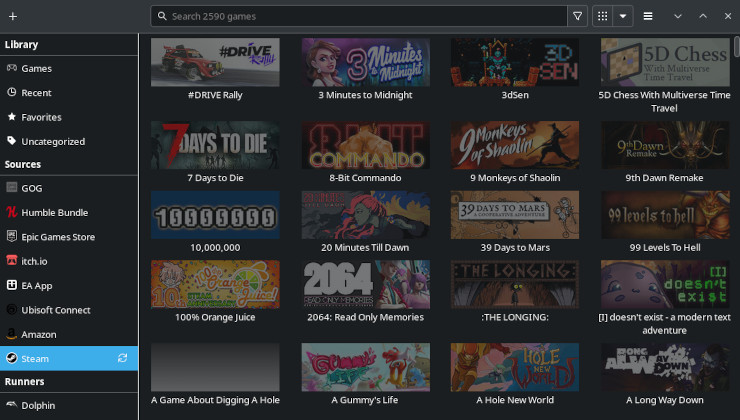Valve continue upgrading and tweaking the Steam client with a fresh Beta version being released today with a couple of tweaks that are interesting for Linux users.
Some of the issues fixed are for everyone including slow startup after suspend, Cloud Sync will now happen as soon as possible to avoid delays launching games and for Remote Play they fixed using multiple PS5 controllers from the Steam Link app.
Just for Linux though these caught my eye today:
- Enabled pipewire desktop capture by default on Linux, pass -nopipewire on the command line to disable it
- Fixed Linux games seeing multiple controllers when Steam controller configuration support is enabled
- Fixed Linux clients not getting any controller input once streaming starts
Some real nice fixes, the controller issues are something I came up against a couple of times. The first one is the bigger and more interesting change as PipeWire is basically the next-generation of audio and video on Linux. As the official website states:
It provides a low-latency, graph based processing engine on top of audio and video devices that can be used to support the use cases currently handled by both pulseaudio and JACK. PipeWire was designed with a powerful security model that makes interacting with audio and video devices from containerized applications easy, with supporting Flatpak applications being the primary goal. Alongside Wayland and Flatpak we expect PipeWire to provide a core building block for the future of Linux application development.
So now that Valve are using it for Remote Play, perhaps this will work even better (especially on Wayland). This is quite likely another improvement to ready up for the Steam Deck, since we already know games will be played on it inside a Wayland session along with it using Gamescope.
I have to disable all HDMI audio devices in Pavucontrol of the host computer to prevent that from happening.
My ex-linux audio recording buddies biggest complaint used to be PulseAudio was terrible & JACK was very difficult to configure and maintain (2016?). They are more hopeful that pipewire is better but yet to try it. It seems like from talking with them they have a renewed interest in Linux especially because of the Steam Deck. I am hopeful that many new talented people develop interest as SteamDeck and Linux in general are amazing development platforms & devices.
Last edited by ElectricPrism on 23 Sep 2021 at 4:04 pm UTC
Is Pipewire the solution to the long standing audio degradation issue with PulseAudio, when it comes to in-home streaming from a Linux host?
I have to disable all HDMI audio devices in Pavucontrol of the host computer to prevent that from happening.
Huh... I'll have to try that fix. Pretty much made everything unplayable for me after an hour or two. Thanks for sharing!
Is Pipewire the solution to the long standing audio degradation issue with PulseAudio, when it comes to in-home streaming from a Linux host?
I have to disable all HDMI audio devices in Pavucontrol of the host computer to prevent that from happening.
Huh... I'll have to try that fix. Pretty much made everything unplayable for me after an hour or two. Thanks for sharing!
Can't promise it will solve your issue, but for my GTX 1660 Super, it's the way to go.
Now if only they would release a 64 bit build...And Wayland support...
One can dream!
Is Pipewire the solution to the long standing audio degradation issue with PulseAudio, when it comes to in-home streaming from a Linux host?
I have to disable all HDMI audio devices in Pavucontrol of the host computer to prevent that from happening.
I had the same issue but didn't know about that solution. I also didn't try yet with Pipewire again. Need to check something...
Is Pipewire the solution to the long standing audio degradation issue with PulseAudio, when it comes to in-home streaming from a Linux host?
I have to disable all HDMI audio devices in Pavucontrol of the host computer to prevent that from happening.
Three simple words:
Yes it is!
I just removed it in debian in favor of pipewire-pulse. Done replacement fake pulse audio packages with equivs to solve dependency problems and bye bye pulse audio crackling system
Is Pipewire the solution to the long standing audio degradation issue with PulseAudio, when it comes to in-home streaming from a Linux host?
I have to disable all HDMI audio devices in Pavucontrol of the host computer to prevent that from happening.
Three simple words:
Yes it is!
I just removed it in debian in favor of pipewire-pulse. Done replacement fake pulse audio packages with equivs to solve dependency problems and bye bye pulse audio crackling system
Hm, for me it didn't solve the issue, I just tested. I think that it took some more time to occur though
Last edited by ljrk on 23 Sep 2021 at 10:42 pm UTC
Last edited by recioalex on 24 Sep 2021 at 6:44 am UTC
[...]
My ex-linux audio recording buddies biggest complaint used to be PulseAudio was terrible & JACK was very difficult to configure and maintain (2016?). They are more hopeful that pipewire is better but yet to try it. [...]
Same here ; I looked into installing Pipewire a few months ago, but from a few forums posts, it still seemed to be not mature enough yet... And with my little Linux knowledge, I am afraid I cannot fix anything if it goes wrong, so I'll be waiting a bit more
Is Pipewire the solution to the long standing audio degradation issue with PulseAudio, when it comes to in-home streaming from a Linux host?
I have to disable all HDMI audio devices in Pavucontrol of the host computer to prevent that from happening.
I am not sure for in home streaming, but for local audio, it already solved quite a few quality issues and bugs for me. In particular, with the latest bluetooth work, LDAC is finally working properly for me. And overall audio seems to be less prone to crackling which I had with pulse.
Hope this helps.
Is Pipewire the solution to the long standing audio degradation issue with PulseAudio, when it comes to in-home streaming from a Linux host?
I have to disable all HDMI audio devices in Pavucontrol of the host computer to prevent that from happening.
Three simple words:
Yes it is!
I just removed it in debian in favor of pipewire-pulse. Done replacement fake pulse audio packages with equivs to solve dependency problems and bye bye pulse audio crackling system
I've stopped using IHS at the moment but switching to Pipewire at the time (~6 months ago) didn't fix this issue.
The only thing that did, as mentioned earlier, was disabling local audio on the host.
I stopped using in home streaming all together because so many games just cast audio and a black screen, hopefully this will solve the issue :D
I've seen this streaming to my phone - watch the resolution on the host PC (switched mine down to 1440p and got video).














 How to set, change and reset your SteamOS / Steam Deck desktop sudo password
How to set, change and reset your SteamOS / Steam Deck desktop sudo password How to set up Decky Loader on Steam Deck / SteamOS for easy plugins
How to set up Decky Loader on Steam Deck / SteamOS for easy plugins
See more from me